Safe to say, were he around today, the Very Reverend Francis Close, the one-time fire breathing Anglican rector of Cheltenham would not be a happy man.
Way back in the 1820s , the reverend would often rail against the perils of alcoholic liquors, betting, adultery and even theatre-going, so obviously he wasn't best pleased to witness a fairly rapid growth in the popularity of racing on Cheltenham’s famous Cleeve Hill.
Such was the effect of Reverend Close’s protestations, the 1829 meeting was reportedly disrupted, with bottles and rocks thrown at horses and jockeys.
Worse would follow. Devout members of his congregation were allegedly responsible for the burning down of the racecourse grandstand the following year, prompting the move down to Prestbury Park.
Hey big spenders
Things have improved for National Hunt fans in the near 200 years since.
Around 280,000 of them came through the gates of Prestbury Park last year. Indeed numbers will be curtailed slightly this year to ensure a more comfortable experience for those attending.
Those travelling spend big too.
A 2016 financial impact report by the University of Gloucester found the festival to be worth around €110m to the local economy. The university repeated the exercise last year and found figures had jumped almost three-fold to €310m.
The study doesn't identify the origin of those attending, but it found a third of them arrive in Cheltenham at least a day before the festival and leave at least a day after. Fair to guesstimate then that around 30,000 or so have crossed the Irish Sea.
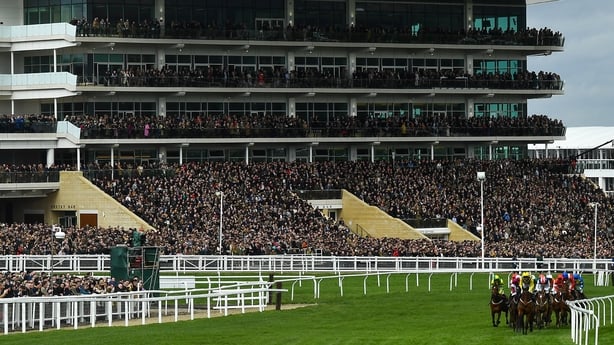
It's certainly not cheap to worship at the colosseum of the Cotswolds. Hotel prices are eye-watering to say the least . A room in one mid-standard hotel chain for example, costing €140 next Tuesday was listed at over €850 tonight (although that does include breakfast!)
On course, a pint is priced at around £7 while a burger is around the £10 mark - no real surprise that the impact study found the average spend per punter is around €800.
Improving Irish fortunes
As a sports mad nation the Irish love to punch above their weight, and if we can wipe the odd English eye in the process all the better.
Recent years have seen Irish trainers dominate Cheltenham’s winners enclosure but it certainly wasn't always so.
From Tom Dreaper to Paddy Mullins to Jessica Harrington, from Arkle to Dawn Run to Moscow Flyer, from Pat Taaffe to Jonjo O’Neill to Barry Geraghty, there have always been Irish superstars at the festival, but in the past, consistent Irish successes were nothing like the near normality of recent times.
Back in 1989 for example, Irish trainers didn't win a single race, and wins in single figures were the norm right up until the mid noughties.
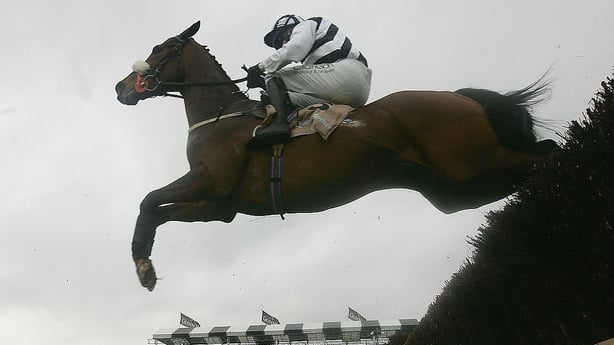
Nine Irish winners in 2005 though, when Moscow Flyer won a second Champion Chase, heralded the start of a real change in Irish fortunes, and though there's been the odd dip since, the impetus has certainly been tinged green in colour in more recent years.
The Prestbury Cup is the annual contest between Britain and Ireland, to see who can train the most winners. It was first introduced in 2014 and stayed in British hands for the first two years.
Since 2016 however, British trainers have managed just one draw (in 2019) as their Irish counterparts have taken almost all before them.
There were 17 Irish winners in 2020, 23 in 2021, and it was 18-10 to the Irish last year.
It's a trend that's led to a fair degree of head-scratching and debate in British racing.
Conor McGregor's line that the Irish don't come to take part but to take over certainly rings true.
Keeping the best at home
If you ask those in the know, there have been two main ingredients in Ireland's improving fortunes - financial and training talent.
"What changed was, we got a few quid together, and could afford to keep the good horses here," says Donn McClean of The Sunday Times.
"Good horses have been bred here for years, but I remember when I was small, a good bumper winner would be snapped up for six figures by David Nicholson or Jenny Pittman. But with the emergence of the likes of Gigginstown and JP McManus, you had owners who could afford to keep horses here.
"And success breeds success, because British owners - the likes of Rich Ricci, Simon Munir and Isaac Souede, or Cheveley Park (whose horses run in red, white and blue colours) - now all have horses in Ireland".
The Closutton maestro
The modern day domination is perhaps best associated with Willie Mullins, whose first training success at Cheltenham came back in 1995 when a horse called Tourist Attraction won the Supreme Novices.
The Closutton handler has seen one of his charges lead the rest home on no fewer than 87 occasions since.
The record holder has been leading trainer at the festival for the past four years and saddled a record 10 winners 12 months ago, the same as all the British handlers combined.
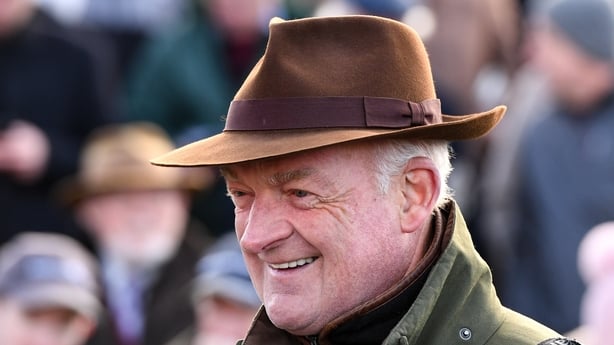
Mullins is odds on to be leading trainer this year too. You add two other names to the Irish ranks, in Gordon Elliott and Henry De Bromhead, and you begin to understand why the Irish grip is so tight.
Undoubtedly Government support and taxpayers' money play their part too in the strength of Irish racing.
British prize money trails what's available in Ireland, while there's an argument too that says there's simply too many fixtures on the British calendar, further diluting the available pot.
Romance is dead
Even if your interest in racing is scant, and provided you're over 40, you will probably have heard of Danoli, the Irish 'banker' at the 1994 festival who duly obliged to win the Sun Alliance Novices’ Hurdle under Charlie Swan.
Danoli was widely regarded as a people's champion, primarily due to his trainer, the late Tom Foley from Bagnelstown in Co Carlow.
At a time, when as mentioned, Irish winners were extra special, Foley epitomised everything National Hunt fans loved.
From a relatively small base he fought and won one of the festival's big prizes. Danoli went on to win 17 races in all.
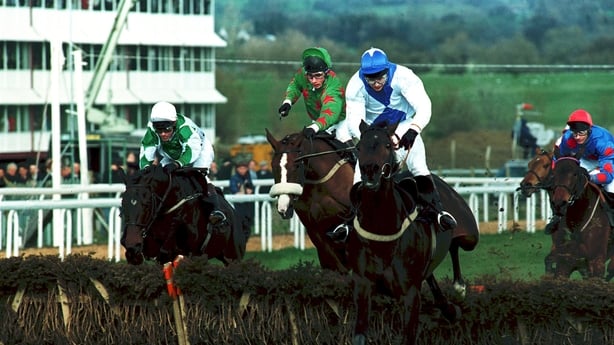
Foley epitomised the "small man" taking on the "big boys". His story just one of many that contributed to the mystique of the festival.
Think Kerry man Tommy Cooper training For Paddy The Plasterer to win the Arkle in 2009 or Paul Hennessy from Kilkenny guiding Heaven Help Us to the Coral Cup two years ago.
Surely the days of the small owners and trainers then are done?
The decent bumper or point to point horse is still being snapped up quickly, albeit by Irish rather than British hands. The owner of that horse could take a chance and hang on for bigger days, but racing is notoriously fickle so the temptation to "cash in" is perfectly understandable.
And yet the Cheltenham fairytales do still happen - there may even be some this week.
Look no farther than Shark Hanlon and Hewick, the wonder horse that cost a paltry €850 but has won a Gold Cup at Sandown, a Galway Plate, and the American Grand National.
Weather permitting, Hewick will line up for the biggest prize of all in Friday's Gold Cup.
Or what about Flooring Porter?
In 2018, four Galway friends clubbed together to buy their superstar for just €5,000 from a Facebook ad.
They've had some craic since, and no shortage of success either.
Flooring Porter will this week bid for a Paddy Power Stayers' Hurdle hat trick.
So does the Irish dominance of recent years decrease the fun?
Not a bit of it says syndicate member Alan Sweeney. "The more you win out there, the better. The Irish would love to win them all, if they could."
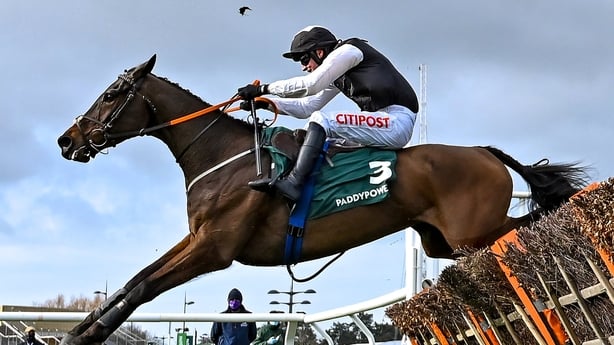
Sweeney feels regular high-class competition is one of the reasons for Irish success over their British counterparts.
"Sure they're taking each other on every weekend here in the hot races. I don't see that happening in England that often, they're avoiding each other a lot. I think that's why the Irish are winning so many".
The Stayers goes off at 3.30pm on Thursday, and if Flooring Porter makes it to the winner's enclosure for a third time, the roars will be heard back in Galway.
Reverend Close certainly wouldn't approve!







